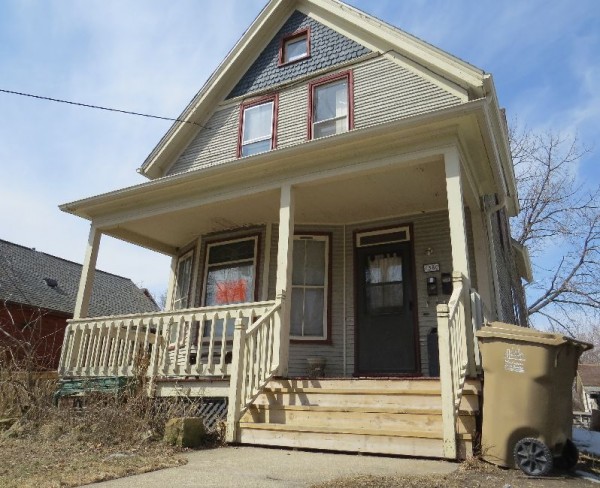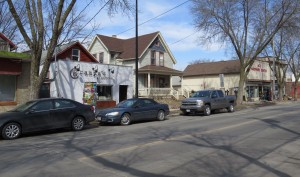Developments at each end of street highlight contrasting neighborhood priorities

1380 Williamson Street is currently vacant, but 16 Bar Spoons wants to turn the residence into a craft cocktail lounge
While every Marquette Neighborhood Association Board meeting is important, tonight’s (March 20) meeting may further illuminate the difference in preferences for development on Williamson Street. With the neighborhood already at loggerheads over too much residential development at 722 and now 706 Williamson; a proposal to convert an existing residence into a craft cocktail lounge did not earn MNA’s Preservation & Development Committee recommendation at Wednesday’s meeting.
Josh Swentzel (Star Liquor, Grampa’s Pizzeria, Tip Top Tavern), Hastings Cameron (Forequarter, Underground Food Collective) and Gilbert Altschul (Grampa’s Pizzeria, Mickey’s Tavern) have formed 16 Bar Spoons, LLC. to lease the property at 1380 Williamson which is currently owed by Ben Altschul (Gilbert’s brother) and which Swentzel says is currently vacant. The yet to be named lounge divided the committee since the location would turn a two-unit residence into a commercial establishment.
An informational letter sent to residents by Swentzel says the partners seek to convert the house into a lounge that will serve “innovative culinary cocktails, craft beer, small grower-producer wine and housemade non-alcoholic beverages at approachable price points.” In addition to being a destination, the location will serve as a “waiting room” for patrons dinning at Grampa’s Pizzeria where wait times on some nights stretch to two hours.
“It’s not going to be a place where we want it to be full every time we open the door, Swentzel told Willy Street Blog. “We want it to be comfortable…its going to be a place where you can sit and relax and enjoy something.”
But some neighborhood leaders are concerned that Willy Street is filling up too fast with commercial establishments that could generate additional noise.
Also, some P&D members were against this particular location because that would leave only one building on the entire north side of the 1300 block with a ground floor residence. It was this particular concern that caused 16 Bar Spoons to be denied an MNA recommendation to the City of Madison’s Alcohol Licensing and Review Committee from P&D. The MNA Board can still vote to send a recommendation to the ALRC.
“Loss of housing stock and affordable housing [was] the primary discussion at the P&D meeting and the primary cause for a negative vote against the lounge,” wrote Committee and MNA Board Member John Coleman. “I propose that MNA ask that the Lounge proposal be revised to include retention of a rental unit on the second floor.”
Coleman was writing in response to a subsequent motion proposed earlier on the listserv by MNA President Micheal Jacob that supports the 16 Bar Spoons proposal but puts limits on food and drink service hours, restricts public access to the front, and allows no outside seating or public areas.

Some neighborhood leaders are concerned about converting more residences on Willy Street to commercial uses.
Swentzel indicated in a later post to the listerv that his group would be mostly amenable to the limits if some of the language was further clarified by the board. Swentzel did not address the proposal by Coleman.
In addition to the above discussion, P&D will also report on a brand new proposal at 706 Williamson which was announced last week by The Rifken Group. During the discussions last fall over 722 Williamson some noted that any development on that block would need to consider the likelihood that The Rifken Group would eventually develop additional parcels.
And don’t forget about the other development announcement last week involving the old Lussier Teen Center, which may become a southern-style restaurant. That proposal by Jonathan Reske will also be up for consideration. As with all of these proposals, the owners are seeking neighborhood letters of recommendation which are great arrows to have in their quivers as they seek approvals before various City committees which hold the only legal yes or no votes.
Intermissions may be required
Before any P&D discussions, District 2 Alder Ledell Zellers and author David Mollenhoff will present on the threats to historic neighborhoods. The Board will discuss the MNA Code of Conduct as well as the impact of Rhythm & Booms moving to Lake Monona.
The Finance Committee continues to evolve after it was split from Fundraising & Festivals last fall. Under discussion tonight will be MNA’s insurance, hiring an accounting firm as well as hashing out further the committee’s charter and operating procedures. The Fundraising & Festivals will also report and may request a vote on Orton Park and Waterfront festival issues.
District 6 Alder Marsha Rummel, Neighborhood Madison Police Officer Andre Lewis will also give their monthly reports to the Board. Monthly Board meetings are held every third Thursday of each month at 7 p.m at Wil-Mar Center.
See this month’s agenda here and the minutes from February’s meeting here



I don’t get it. I drive down willy and I see a vibrant eclectic bunch of small businesses intermixed with old dilapidated homes crumbling on their foundations while property management firms ignore their responsibility to keep them maintained. Let the street evolve. The small businesses revive the old buildings and provide jobs that pull in money from outside the neighborhood and help people “afford” housing that is inhabitable. How is this a bad thing?
I don’t understand this either. Willy is a vibrant commercial corridor. Why not allow it to continue to flourish by allowing small businesses to continue to fill in along the street? Doing so will improve the health of the businesses by allowing the corridor to strengthen. Filling in the non-commercial gaps will also encourage walking and shopping.